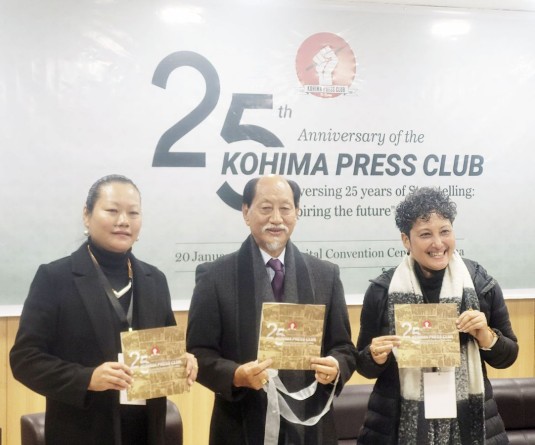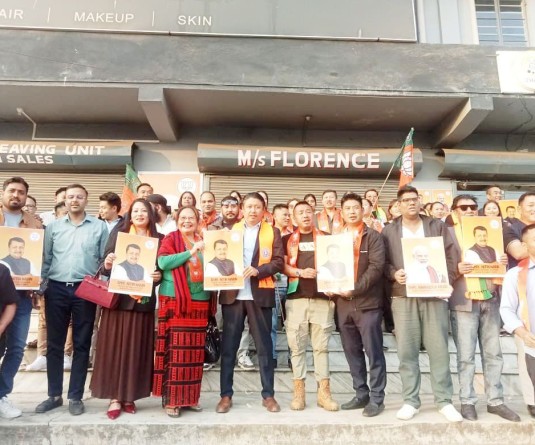Chairman of Nagaland Beekeeping and Honey Mission (NBHM), Obed Quinker with Team Leader Sentiwapang Aier and Deputy Team Leader Er Khuvozoyi Vese brief the press at Multi Utility Centre, Sovima on November 27. (Morung Photo)

NBHM touts Api tourism as immersive eco-conscious experience
Morung Express News
Chümoukedima | November 27
For the first time, the Nagaland Beekeeping and Honey Mission (NBHM) will be launching the ‘Bee tourism’ at this year’s Hornbill festival from December 1-10 at Kisama Heritage Village.
This was announced by the Chairman of NBHM, Obed Quinker today, during a press briefing held at Multi Utility Centre, Sovima.
Being a novel venture of the NBHM, it seeks to showcase Nagaland’s rich beekeeping tradition and unique practices carried out across the state to the travellers.
It aims to offer an immersive beekeeping experience and maximise its opportunity, while also to sensitise the people about the importance of honeybees and its contributions to humankind, the farming communities and biodiversity conservation, he said.
It endeavours to provide diversified employment opportunities for different segments of the populace and also to preserve the rich natural resources.
Bee tourism or Api tourism is an eco-conscious travel experience which would introduce tourists and visitors to the fascinating world of honey bees.
This year, Quinker informed, it would cover only one village under Kohima district i.e. Mima, which is located in the south eastern part of Kohima, about 3 km away from Kisama, and about 12 km away from the capital city.
It will provide a firsthand learning experience on rearing of honey bees and its extraction to all tourists and honey aficionados from the bee farmers, while also putting up Mima village in the map of the Hornbill festival for the first time, he said.
Mima has been recognised as the ‘honey village’ because of its vast and unique style of traditionally practiced underground beekeeping that has been in existence for generations.
In this regard, Quinker said that the NBHM has conceptualised and spearheaded ‘the Bee and Honey trails to Mima village’ which will officially be flagged off on November 29 by Abu Metha, Advisor to Chief Minister and Chairman of IDAN, from the Honey Hub at Kisama.
The trails are being held in collaboration with Mima Village Beekeeping Committee, Mima Tourism Committee and the Nagaland Tourist Association.
‘India Trail,’an eco tour agency will be offering their expertise in curating the trails. The itinerary would include a guided tour to the apiaries run by the Mima Village Beekeeping Committee, formed under the initiative of the NBHM, and also a cultural walk in the village, informed Quinker. “Made in Mima” products like textiles, handicrafts, local drinks and food products would be showcased, where interested tourists can buy.
The NBHM will also be introducing the Honey Hub at the Hornbill festival and the newly created one-stop place for honey will be inaugurated by the Chairman at Kisama, located near the Bamboo Hall on December 1.
Running for the entire stretch of the festival, the stall will display and sell varieties of honey products from all over Nagaland.
Visitors will get to meet the beekeepers and listen to their stories while various beeswax products, bee pollinated agri and horti crops, confectionary and beverages made using honey by local bakers, souvenirs and memorabilias related to honey bees will also be sold at the stall.
It will also feature Apitherapy sessions, artistic corner for face painting experience with bee themed designs by professionals.
The NBHM plans to make it a permanent space in the near future.
Further, the 5th edition of the ‘Nagaland Honey Bee Day 2023’ will be celebrated on December 5 at the Bamboo Hall, Kisama.
The day is dedicated to pay tribute to the hardworking honeybees, the beekeepers and the supporters for their relentless efforts to promote rural tourism and boost rural economies, said Quinker while adding that it will also be a day to reiterate “our visions and goals and garner the beekeeping momentum with the right strategies and plan for a sustainable and progressive path ahead.”
Acknowledging the active participation of Nagaland Beekeepers on the government’s effort, the NBHM will be awarding the best beekeepers in the state, district and village categories.
At present, there are around 1 lakh 20 thousand beekeepers (both scientific and traditional practices) across the state, informed Er Khuvozoyi Vese, who is the Deputy Team Leader of NBHM.
While there is a huge demand of locally produced “Nagaland Honey,” nationally and internationally, the State is able to produce only 400-600 metric ton of honey annually, to which majority of the produce is consumed by the local market, leaving only a margin for export.
While highlighting fund constraints and want of suitable ecosystem for large-scale rearing of honeybees as major obstacles to the traditional beekeeping practices in Nagaland, the team of 13nevertheless, exuded optimism that it is “doing everything possible for development projects.”
“As a team, we are trying to make it a success, with outreach programmes to different rural pockets in the pipeline,” they added.





